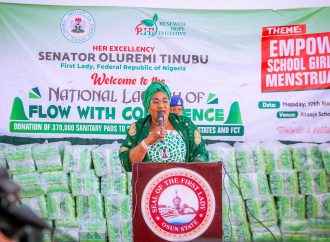Femi Otedola Hails Tinubu’s 15% Petrol, Diesel Import Tariff Policy Billionaire businessman and Chairman of Geregu Power Plc, Femi Otedola, has applauded President Bola Ahmed Tinubu for introducing a 15 percent import tariff on petrol and diesel, describing it as a bold and strategic move that will transform Nigeria’s downstream oil and gas sector. PDP
Femi Otedola Hails Tinubu’s 15% Petrol, Diesel Import Tariff Policy
 Billionaire businessman and Chairman of Geregu Power Plc, Femi Otedola, has applauded President Bola Ahmed Tinubu for introducing a 15 percent import tariff on petrol and diesel, describing it as a bold and strategic move that will transform Nigeria’s downstream oil and gas sector.
Billionaire businessman and Chairman of Geregu Power Plc, Femi Otedola, has applauded President Bola Ahmed Tinubu for introducing a 15 percent import tariff on petrol and diesel, describing it as a bold and strategic move that will transform Nigeria’s downstream oil and gas sector.
PDP Ag. National Chairman Abdulrahman Mohammed Assumes Office Amid Heavy Security
Otedola said the policy reflects the President’s vision for a self-reliant energy future and demonstrates strong political will to support local refining capacity. According to him, the decision will not only encourage private sector participation but also protect local investors and create a more sustainable framework for the nation’s petroleum industry.
Otedola Commends Tinubu’s Leadership
In a statement issued on Monday, Otedola said President Tinubu’s administration had once again shown commitment to industrial growth and economic stability by prioritizing policies that favour domestic production over import dependence.
He praised the President for making a decision that “balances fiscal responsibility, economic nationalism, and investor confidence.”
“This bold step by President Tinubu is a masterstroke in Nigeria’s energy policy. It creates a level playing field for local refiners and investors while reducing the overdependence on imported petroleum products that has weakened our economy for decades,” Otedola said.
The billionaire businessman, who has long been an advocate for indigenous participation in Nigeria’s energy space, said the 15% import tariff will encourage Nigerian refineries, such as the Dangote Refinery, Port Harcourt Refinery, and other modular refineries, to thrive competitively.
Boost for Local Refining and Job Creation
The Nigerian energy market has for years suffered from massive foreign exchange losses due to fuel importation. Despite being Africa’s largest crude oil producer, Nigeria still imports over 90% of its refined petroleum products.
Otedola said Tinubu’s policy is “a step in the right direction,” as it will strengthen domestic refining, reduce foreign exchange pressure, and create thousands of jobs.
“When local refineries operate at full capacity, we will save billions in foreign exchange and create jobs for our people. This policy gives Nigerian investors the confidence to expand operations and attract global partnerships,” he noted.
Industry analysts agree that the tariff policy will serve as an incentive for investors, particularly with the 650,000 barrels per day Dangote Refinery already producing diesel and aviation fuel locally. The tariff will make imported products more expensive, encouraging marketers to source fuel from domestic refineries instead.
Economic and Fiscal Impact
The introduction of a 15% import duty on petrol and diesel is also expected to boost government revenue and reduce smuggling of petroleum products. The Federal Government says the policy aims to strike a balance between consumer protection and industrial development.
Economic experts say while the initial effect might cause a slight increase in the cost of imported fuel, the long-term benefits will outweigh the short-term challenges.
Dr. Chijioke Nwosu, an energy economist, noted that the tariff would serve as a protection mechanism for local producers.
“The era of dumping foreign refined fuel into the Nigerian market must end. With this policy, Nigeria is taking a firm stand to promote local production, generate jobs, and achieve energy sovereignty,” Nwosu said.
Encouraging Sustainable Growth
Otedola also highlighted that the policy aligns with Tinubu’s Renewed Hope Agenda, which focuses on economic diversification, infrastructure investment, and industrial reform. He urged other Nigerian entrepreneurs to support government initiatives designed to strengthen local industries.
He said:
“This is not just about tariffs; it is about building confidence in Nigeria’s capacity to produce and refine its own fuel. It is about energy security, national pride, and long-term economic transformation.”
Otedola noted that with the current administration’s emphasis on private-sector-led growth, the energy sector will continue to play a vital role in job creation, foreign investment, and technology transfer.
Analysts Predict Brighter Future for Nigeria’s Oil Sector
The 15% import tariff policy is projected to gradually reshape Nigeria’s oil and gas landscape, especially as domestic refineries ramp up production. Experts believe the Dangote Refinery alone could meet over 70% of the country’s fuel demand by 2026, drastically reducing import dependence.
Furthermore, the tariff could encourage modular refineries in states like Edo, Rivers, and Akwa Ibom to increase capacity utilization, boosting Nigeria’s GDP and export earnings.
Otedola emphasized that policies like this demonstrate the government’s seriousness about implementing reforms that foster growth rather than short-term populism.
“President Tinubu’s decision shows foresight and courage. This is how industrial revolutions begin — with clear policy direction and the political will to see it through,” he said.
Conclusion
Femi Otedola’s commendation of Tinubu’s 15% petrol and diesel import tariff underscores growing private sector confidence in the administration’s economic agenda. The policy, experts say, could mark a turning point for Nigeria’s oil industry — moving the nation from dependency on imported fuel to becoming a regional refining powerhouse.
As Otedola noted, the success of the policy will depend on consistent enforcement, infrastructure investment, and collaboration between government and private investors. Still, it represents a major leap toward a self-sufficient, energy-secure Nigeria.


















Leave a Comment
Your email address will not be published. Required fields are marked with *